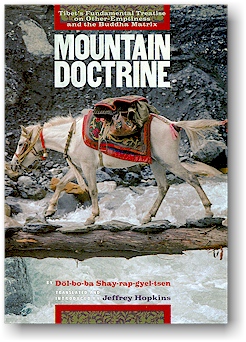 Mountain Doctrine
Mountain Doctrine

Translated here for the first time into any language, Mountain Doctrine, Ocean of Definitive Meaning: Final Unique Quintessential Instructions is a seminal fourteenth-century Tibetan text on the nature of reality. The author, Dol-bo-ba Shay-rap-gyel-tsen, was on of the most influential figures of that dynamic period of doctrinal formulation and his text is a sustained argument about the buddha-nature, also called the matrix-of-one-gone-thus.
Dol-bo-ba recognizes two important types of emptiness--self-emptiness and other-emptiness--and shows how other-emptiness is the actual ultimate truth. He justifies this controversial formulation by arguing that it was the favored system of all the early outstanding figures of the great vehicle and by showing how important these doctrines were in India.
The translator's introduction includes a short biography of Dol-bo-ba and an exposition of nine focal topics in his religious philosophy.
"The Mountain Doctrine of Dolpopa Sherab Gyaltsen is one of the great monuments of Tibetan philosophical literature. For nearly 700 years Dolpopa's work has been a fundamental source of inspiration for practitioners attracted to the definitive meaning of the Buddha's teachings. Jeffrey Hopkins deserves our sincere gratitude for making this profound message finally available to students of the Dharma outside Tibet."--Cyrus Stearns, author of The Buddha from Dolpo
"At long last a translation of one of the great classics of Tibetan Buddhism, Dolpopa's Mountain Doctrine. Hopkins' many years of careful study of this important work make it the most detailed, extensive, and accurate treatment in a Western language of the Jo nang pas' influential interpretation of emptiness, the 'emptiness of what is other' ...A landmark in the study of Tibetan Buddhist thought."--JosÚ Ignacio Cabezˇn, XIVth Dalai Lama Professor of Tibetan Buddhism and Cultural Studies, University of California Santa Barbara
"This monumental publication will serve as an invaluable source on emptiness and buddhanature for generations to come."--Buddhadharma magazine
|